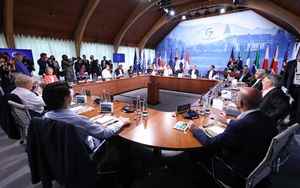(Finance) – The invasion of Ukraine by Russia but also climate and health. These are the themes at the center ssecond and final day of the G7, hosted in Garmisch-Partenkirchen, in the castle of Schloss Elmau. “Relations with Russia will not be able to go back to being as they were before the war in Ukraine,” said German Chancellor Olaf Scholz, accusing the Russian government of breaking all international cooperation agreements and stressing that when it happened in Ukraine it represents a “point. of rupture in international relations “. “Today is not the time to negotiate,” he stressed in his speech Ukrainian president Volodymyr Zelensky.
“We will continue to guarantee financial, humanitarian, military and diplomatic support and we will stand by Ukraine for as long as necessary” the G7 leaders reiterated in the draft of the final communiqué. There is a commitment “to help Ukraine to end Russia’s war, to maintain sovereignty and territorial integrity, to defend itself and to choose its future”. From the G7 comes a message condemning the “brutal, unprovoked, unjustifiable aggression against Ukraine from Russia, aided by Belarus”. “We continue and we will continue not to recognize Russia’s attempts to rewrite the borders by force”, underline the leaders gathered in Bavaria assuring that they will continue to coordinate to provide material, training, logistics, intelligence and economic support to educate the Ukrainian armed forces .
On the economic front, there is the determination to reduce Russia’s revenues. In the sights of the G7 it stop importing Russian gold, Vladimir Putin’s strategic source of funding for the war in Ukraine, with a close to nearly $ 20 billion. With 10% of the total – according to the latest figures from the World Gold Council – Russia is, in fact, the second largest producer of gold in the world. Since the war began, exports of the precious metal have increased as the elite used it as a safe haven to circumvent Western restrictions. In addition, gold is the main export item for the entire economy after energy, on the order of nearly $ 19 billion a year. About 5% of global exports in 2020, according to the White House. Most of it, 90%, is destined for the G7 countries that want to ban it. The United Kingdom imported up to 17 billion dollars, and it is no coincidence that British Prime Minister Johnson said that this measure “will directly affect the Russian oligarchs and the heart of Putin’s war machine”.
The leaders of the G7 aim to weaken Russia also on the defense front. The United States has already announced the imposition of over two billion dollars in duties on hundreds of Russian products. In detail, the goal of the G7 is to put a stop to Russian arms production and the Russian distribution chain. The squeeze against Moscow – as the Biden administration pointed out – aims to “further restrict access to industrial inputs, services and key technologies produced by our economies, especially those that support Russia’s armaments industrial base and technology sector. “. Washington will hit Russian defense supply chains by imposing sanctions on major state-owned industry firms, research organizations and dozens of other defense-related entities and individuals. And it will limit Russia’s ability to replace military equipment it already lost during the war in Ukraine. President Joe Biden is also preparing to announce an increase in tariffs on more than 570 Russian product groups for a total of about 2.3 billion. As for the EU countries of the G7, the adoption of a new package of sanctions (the seventh) will, as always, be possible only with unanimity among the 27, so we will have to wait for the outcome of the confrontation in Brussels.
The big names of the G7, however, are aiming for a much broader involvement. Three of the five emerging countries invited by Germany to the summit (India, South Africa and Senegal) in fact, they have not yet taken a position in the conflict. “They will have to choose which side to take”, is the message coming from the summit.
On the front of the climate the heads of state and government of the G7 and of India, Indonesia, Senegal, South Africa and Argentina have agreed that they will work together to “accelerate a clean and just transition to climate neutrality while ensuring energy security”.
